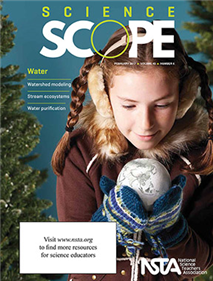All Resources
Journal Article
PreK students engage in science talk and head outside to build Earth science knowledge and process skills....
Journal Article
An introduction to environmental stewardship for preschoolers....
Journal Article
Round and Round the Water Cycle
Observations and investigations lay the groundwork for primary students’ future Earth science experiences....
Journal Article
Crowdfunding for Elementary Science Educators
A way to bridge the gap between curriculum needs and financial support....
Journal Article
Countdown to the Great American Eclipse
How to prepare students for the August 2017 total solar eclipse in the context of the Next Generation Science Standards....
Journal Article
Best STEM Books for Students K–12
Selected by the National Science Teachers Association/Children’s Book Council Review Panel...
Journal Article
The Early Years: Looking at Landscapes
This column discusses resources and science topics related to students in grades preK to 2. In this month’s issue students study landscape surfaces to recognize changes due to human impacts or natural phenomena....
Journal Article
Editor's Note: Early Childhood Engagement in Science
Science and Children’s editor shares thoughts regarding the current issue....
Journal Article
Teaching Through Trade Books: Focusing on Earth’s Features
This column includes activities inspired by children’s literature. This month’s issue shows that allowing students to use both photographs and information presented through technology helps them begin to construct an understanding of landforms an...
Journal Article
Poetry of Science: Water, Water, Everywhere
Building literacy in playful, meaningful ways. This month's activity explores the water cycle....
Journal Article
Science 101: Why Do We Only See One Side of the Moon?
This column provides background science information for elementary teachers. This month’s issue discusses the rotation of the moon....
Journal Article
Methods and Strategies: Science Notebooks as Learning Tools
This column provides ideas and techniques to enhance your science teaching. Lessons from a multi-year professional study group offer insights on getting the most out of science notebooks....
Journal Article
Engineering Encounters: From STEM to STEAM
This column presents ideas and techniques to enhance your science teaching. Incorporating the arts in a roller coaster engineering project....
Journal Article
Supporting Student Understanding of Watersheds by Using Multiple Models to Explore Elevation
Use a variety of tools to help students understand how water flows through a watershed....
Journal Article
Learning and Applying Systems Thinking When Studying a Local Creek System
Help students see the big picture as they attempt to identify the boundary and parts of a local creek system....
Journal Article
From Fish Tank to Fuel Tank: Engineering Photobioreactors in the Classroom
Grow algae in the classroom to explore bioenergy and related concepts....
Journal Article
Build on students’ prior knowledge of watersheds to solve the problem of how to clean water....




